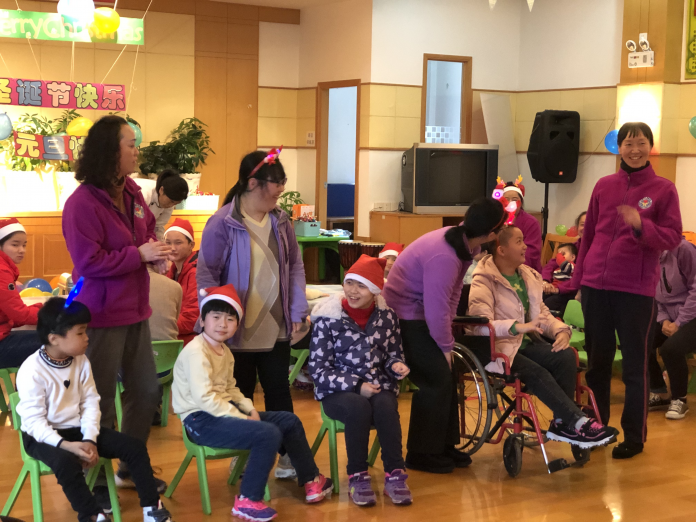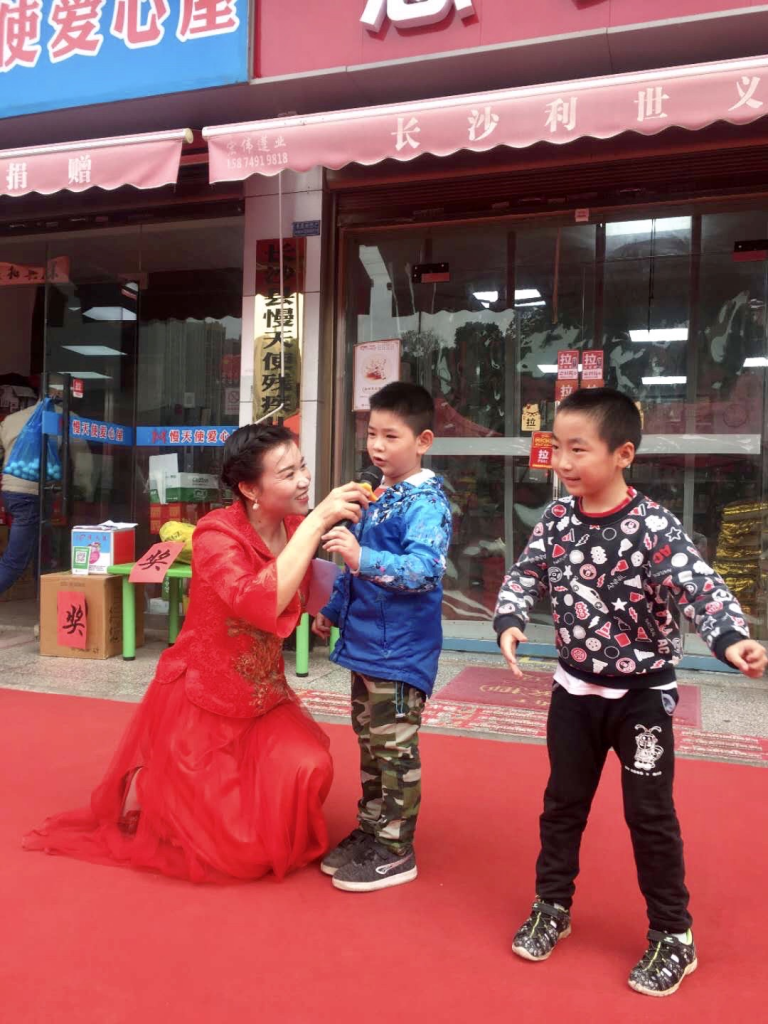
In China, caregivers of children with cerebral children are struggling with family dysfunction and educational barriers, meanwhile, find themselves ostracised by society.
By Savoki Zhang in Jiangsu
After taking care of her son with cerebral palsy on her own for 13 years, Yang* feels a big weight off her shoulder after putting him in the care of a psychiatric hospital in Wuxi, Jiangsu.
Her only son was diagnosed with cerebral palsy at 13 months old as he could not stand on his own even when holding onto something for support. Situation deteriorated as he grew up and developed aggressive behaviours such as biting and hitting others with uncontrollable rages.
“The moment I walked out of the hospital gate, I felt relieved ,” Yang, who wants to stay anonymous, recalls the day that she separated with her beloved son four years ago like it happened yesterday.
The 46-year-old mother, who now makes a living as a lottery retailer, visits her son twice a month.
“The moment I walked out of the hospital gate, I felt relieved.”
Family Dysfunction
Cerebral palsy is the most common of all childhood disabilities.
It is caused by damage that occurs to immature brain as it develops, most often before birth. Common symptoms include poor coordination, stiff or weak muscles, and other problems such as swallowing difficulties and intellectual disabilities.
Occurring in about 2.5 per 1,000 live births in China, about five million children aged under 14 suffer from such an incurable and permanent condition across the country, with 40,000 babies born with the disorder each year, according to an epidemiological investigation carried out in 2013.
Bringing up a child with cerebral palsy is no easy task. Primary caregivers, in most cases, parents, often suffer from tremendous financial burdens, insufficient spousal support and family dysfunction.
After the diagnosis, Yang quit her job to look after her son. The father became the major breadwinner of the family and the couple divorced in 2015 after numerous rounds of fierce fights.
“I was drowning in the burden of the 24/7 caregiving mode,” she recalls.
“I suffered from severe backache and waist pain as I had to bend down every time I fed and tried to talk to my son on a wheelchair,” she says, adding her ex-husband, who worked in a multinational corporation, often left home for business trips.
“He didn’t understand the torment a mother had to endure. I quit my job to take care of our son. When my son and I were at home, I could not stop thinking about the tough times I had and the years yet to come. I thought to myself the suffering would be with me forever,” Yang says with tears streaming down her face.
“I was so lonely, exhausted and frustrated about being trapped inside such a never-ending cycle of caring. I saw no way out,” she adds.
“I was so lonely, exhausted and frustrated about being trapped inside such a never-ending cycle of caring. I saw no way out.”
For families of children with cerebral palsy, to have an outlet such as sharing problems with other parents who are going through the same situation makes a lot of difference.
“If you become one of us, you will understand how important it is to have a sense of solidarity among families with special needs children,” says Yao Zhijun, founder of Home to Slow Angels, a charity home in Hunan aiming to establish mutual help network in the special needs community.
“Merely knowing that you are understood, without having to explain yourself … is already a very comforting for these parents,” she adds.
Though incurable, early diagnosis, therapies, and proper rehabilitative measures can improve the living quality of these patients by minimising symptoms and maximising their physical, cognitive, social, and emotional potential, according to the Centres for Disease Control and Prevention of the United States.
In China, medical expenses, which are not or imperceptibly covered by health insurance, are an enormous burden to low-income working Chinese families.
Yao says many families visit the charity home as it is close to Hunan Boai Rehabilitation Hospital, which offers free treatment to cerebral palsy children.
“Many parents dried up their savings on treatments and medicines for their children before coming here. The medical fee in other hospitals is too expensive,” Yao says.

A survey published by Harvard T.H. Chan School of Public Health in 2016 found that, in Chengdu, the monthly expense was around RMB ¥9,000 to 10,000 among families elected for treatment in rehabilitation centres.
Only 25 per cent of the cost was covered by New Cooperative Medical System, a government initiated insurance policy aiming to safeguard farmers’ access to basic health services and alleviate their financial burden.
In June, 2018, a nine-year-old Chinese girl was pushed into a river by her father and grandfather. They confessed of wanting to get rid of her over the fear that they could not afford taking care of the girl, Yangtse Evening News reported.
Education Barriers
Some parents however, try every means to nurture these children.
“Jie is disabled, both physically and intellectually…but I always think he deserves a chance to get in touch with the society, just like other kids of his age,” Zoey*, an entrepreneur based in Wuxi, Jiangsu, who asks to stay anonymous, says.
She found her elder son, Jie, aged 24 now, suffering from cerebral palsy when he was four months old.
But the 45-year-old mother encountered many difficulties in finding a school for her son.
“There was only one boarding school for disabled children in the whole city at that time,” she recalls. “Jie failed to get into it due to residential restrictions. I begged the principal – a truly compassionate old lady – for two years to earn him a place there,” she says.
Basic education and therapy for children aged five to 18 with special education needs were offered at the school, in accordance with the nine-year compulsory education. But the quality of education and care provided by the school was, in Zoey’s words, “far from satisfactory”.

The school offered accommodations for more than 30 children. Most of them suffer from cerebral palsy, Down Syndrome and autism. But there were only two ‘teachers’ – both were retired female workers in their 50s, in charge of their life.
Zoey’s son once fell off from the stairs and hurt his head after being pushed by another child with attention-deficit and hyperactivity, the mother recounts.
A former teacher of Jiangyin Gold Key Special Education Centre, another special education school in Jiangsu, who only revealed her name as Chen*, says most teachers working in schools for children with special needs are neither qualified therapists nor professional trained teachers.
“Many of us were planning to quit the job if we could find a slightly better one,” Chen says.
“The pay is too low, and we are not recognised by the society or the system as teachers…We hardly get any sense of accomplishment and satisfaction,” she adds.
“We hardly get any sense of accomplishment and satisfaction.”
In China, the demand for special education professionals far outweighs its supply.
Nanjing Normal University of Special Education is the only independent college in the country specialising in training these teachers. Seventy eight universities, meanwhile, train about 7,100 students majoring in special education a year.
In June, 2020, China’s Ministry of Education issued a guideline requiring all normal colleges and faculty of education in comprehensive universities to offer special education courses in order to improve teaching to disabled children.
Social Stigma
Facing many difficulties and struggles in taking care of their children, what may be more heart-rending is the misunderstandings and discrimination caregivers are facing.
“People assume that she (my daughter) is mentally handicapped the minute they see her,” Hayley says. Her daughter was diagnosed with cerebral palsy at four months old. The now eight-year-old girl has relatively mild physical symptoms with normal intellect.
Hayley*, a 38-year-old engineer, who asks to remain anonymous says her daughter is ridiculed and verbally attacked by other children.
“In early days I avoided using the word ‘cerebral palsy’ when I mentioned my daughter’s condition to the relatives at family gatherings, I would often say ‘developmental delay’ instead…I felt so ashamed,” she says.
“Cerebral palsy”, in Chinese, “Naotan”, has long been used as an insult, a synonym for “idiot, fool and useless person”.
Yang also recounts avoiding taking her son out for fear of stare-downs. “We still have a long, long way to go before having the stigma and misunderstandings removed,” the single mom laments.
“Not only children with cerebral palsy, but us caregivers, fail to be treated with dignity…and one day even we ourselves, give up treating ourselves with dignity,” Yang adds.
“Not only children with cerebral palsy, but us caregivers, fail to be treated with dignity.”
“At some point I suddenly realised I shouldn’t be the one feeling ashamed. It is the society that fails to treat her and us caregivers fairly, as a true person,” Hayley says.
*Name changed at interviewee’s request
Edited by Lasley Lui & Regina Chen






































